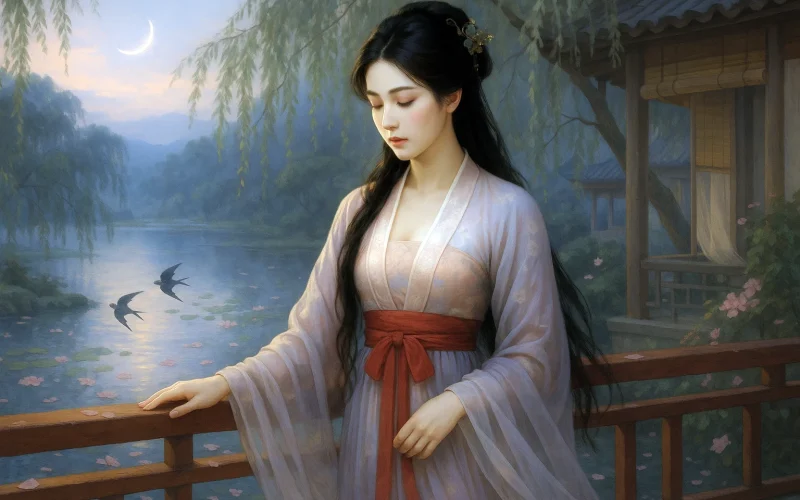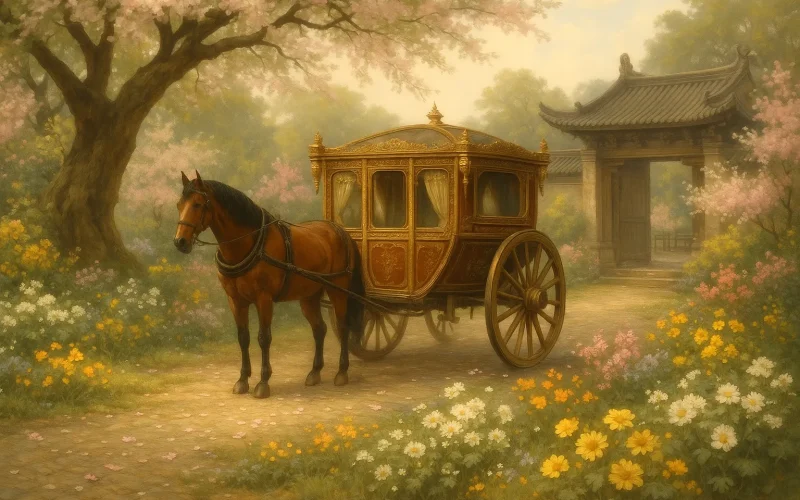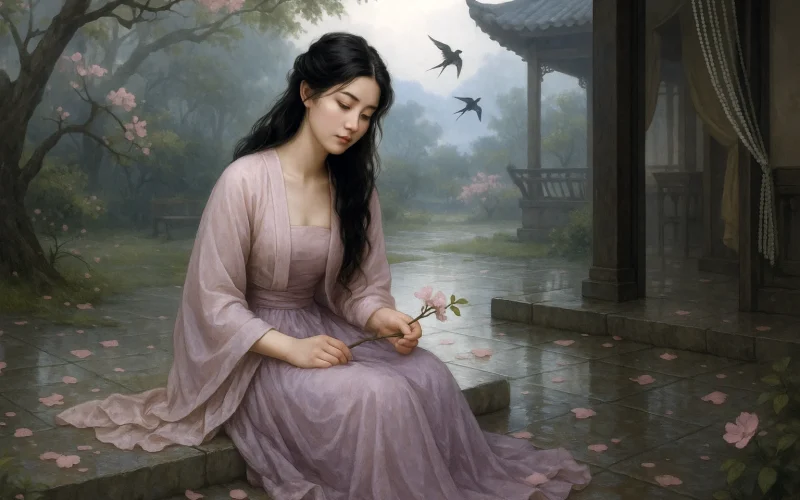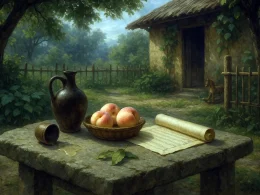Rain clears, mist lingers at dusk’s call,
New pools brim with green water’s sprawl.
A pair of swallows dart through willow’s court,
Where painted screens roll up in tower’s hold.
At twilight lone I lean on scarlet rails,
Watching the crescent moon—southwest it veils.
Wind stirs fallen blooms by steps below,
My silken robe feels spring’s abrupt chill flow.
Original Poem
「清平乐 · 雨晴烟晚」
雨晴烟晚。绿水新池满。
双燕飞来垂柳院,小阁画帘高卷。黄昏独倚朱阑。西南新月眉弯。
冯延巳
砌下落花风起,罗衣特地春寒。
Interpretation
This poignant lyric, crafted by Feng Yansi—a luminary of Southern Tang's ci poetry—captures a woman's bittersweet longing and resentment toward her unfaithful lover during late spring. Renowned for his delicate portrayals of feminine emotions, Feng employs rain, grass, setting sun, and falling petals to construct an intimate psychological landscape, where unrequited love intertwines with the passing of spring. The poem's emotional authenticity and vivid imagery render it profoundly moving.
First Stanza: "细雨湿流光,芳草年年与恨长。"
Xì yǔ shī liú guāng, fāng cǎo nián nián yǔ hèn zhǎng.
Fine rain dampens flowing time,
while sweet grasses lengthen with year upon year of grief.
The opening couplet merges natural and temporal imagery with exquisite subtlety. "Fine rain dampens flowing time" (细雨湿流光) personifies time as something tangible that can be moistened by rain, creating a hazy, melancholic spring scene. The phrase also metaphorically suggests the erosion of joy by sorrow. "Sweet grasses lengthen with grief" (芳草年年与恨长) materializes abstract sorrow into the ever-growing grass, illustrating how nature's cyclical renewal contrasts with the woman's unending heartache.
"烟锁凤楼无限事,茫茫。鸾镜鸳衾两断肠。"
Yān suǒ fèng lóu wú xiàn shì, máng máng. Luán jìng yuān qīn liǎng duàn cháng.
Mist locks the phoenix tower's untold sorrows—
oh, this boundless void!
The paired-phoenix mirror and lovebird quilt now sever the heart twice over.
Here, the "phoenix tower" (凤楼), traditionally a symbol of romantic encounters, is shrouded in mist—a metaphor for obscured emotions and unspoken pains. The "boundless void" (茫茫) amplifies the woman's existential loneliness. The "paired-phoenix mirror" and "lovebird quilt" (鸾镜鸳衾), objects meant for couples, now accentuate her solitude. "Sever the heart twice over" (两断肠) is a masterstroke: it implies both objects wound her doubly, and that her anguish comes in waves.
Second Stanza: "魂梦任悠扬,睡起杨花满绣床。"
Hún mèng rèn yōu yáng, shuì qǐ yáng huā mǎn xiù chuáng.
In dreams, my soul roams free,
only to wake and find willow catkins strewn across the embroidered bed.
Dreams offer the woman temporary escape ("my soul roams free"), but reality cruelly intrudes with "willow catkins" (杨花)—symbols of spring's end and love's evanescence—littering her bed. The contrast between dream liberty and waking loneliness underscores her emotional desolation.
"薄悻不来门半掩,斜阳。负你残春泪几行。"
Bó xìng bù lái mén bàn yǎn, xié yáng. Fù nǐ cán chūn lèi jǐ háng.
The fickle one stays away; the door stays half-ajar,
as sunset lingers.
"I've wasted the last of spring for you"—
and now, these futile tears.
The "half-ajar door" (门半掩) poignantly captures her conflicted hope and resignation. The "setting sun" (斜阳) mirrors both the dying spring and her fading hopes. The final line—"I've wasted the last of spring for you" (负你残春)—shifts blame ambiguously: is she chiding herself for wasted youth, or reproaching her lover for his absence? The "futile tears" (泪几行) conclude the poem with understated devastation.
Holistic Appreciation
This ci employs emotionally charged imagery—drizzling rain, fragrant grass, slanting sunlight, and willow catkins—to depict a woman’s solitary longing as she waits in vain for her unfaithful lover’s return on a spring day. From the damp spring light to the vastness of her sorrow, from the wandering of her dream soul to tears shed under the setting sun, the poem builds emotional momentum with vivid imagery and lyrical intensity.
The poet unfolds the woman’s monologue, blending spring scenery with heartfelt emotion to portray her entangled, unspoken anguish amid the misty spring scene. Each line appears to describe the landscape, yet the scenery is steeped in feeling, and the feeling dissolves into the scenery—a seamless fusion of scene and sentiment, subtle yet profound.
Artistic Merits
- Elevated Opening, Deep Imagery
The line "Fine rain dampens flowing light" carries both visual beauty and a dual melancholy of time and mood. - Interwoven Scenery and Emotion
From "fragrant grass" and "phoenix tower" to "willow catkins" and "slanting sunlight," every scene is imbued with emotion, heightening the lyrical effect. - Delicate Conception, Double Meaning
Phrases like "two hearts broken" and "I’ve failed you, fading spring" carry implied meanings, enriching the poem’s subtle beauty. - Elegant Language, Lyrical Style
The diction is refined yet natural, the emotions tender and nuanced, showcasing Feng Yansi’s mastery in portraying feminine sentiment.
Insights
This work captures a poignant state of "feeling time slip away while waiting." It reminds us that the most moving aspect of love is often not grand declarations but the half-open door in the drizzling rain or the willow catkins scattered under the setting sun. Through a woman’s perspective, the ci expresses restrained sorrow and resentment over lost love, standing as a quintessential example of the lyrical ci tradition. It invites us to contemplate the fragile yet profound persistence embodied in its verses.
About the Poet
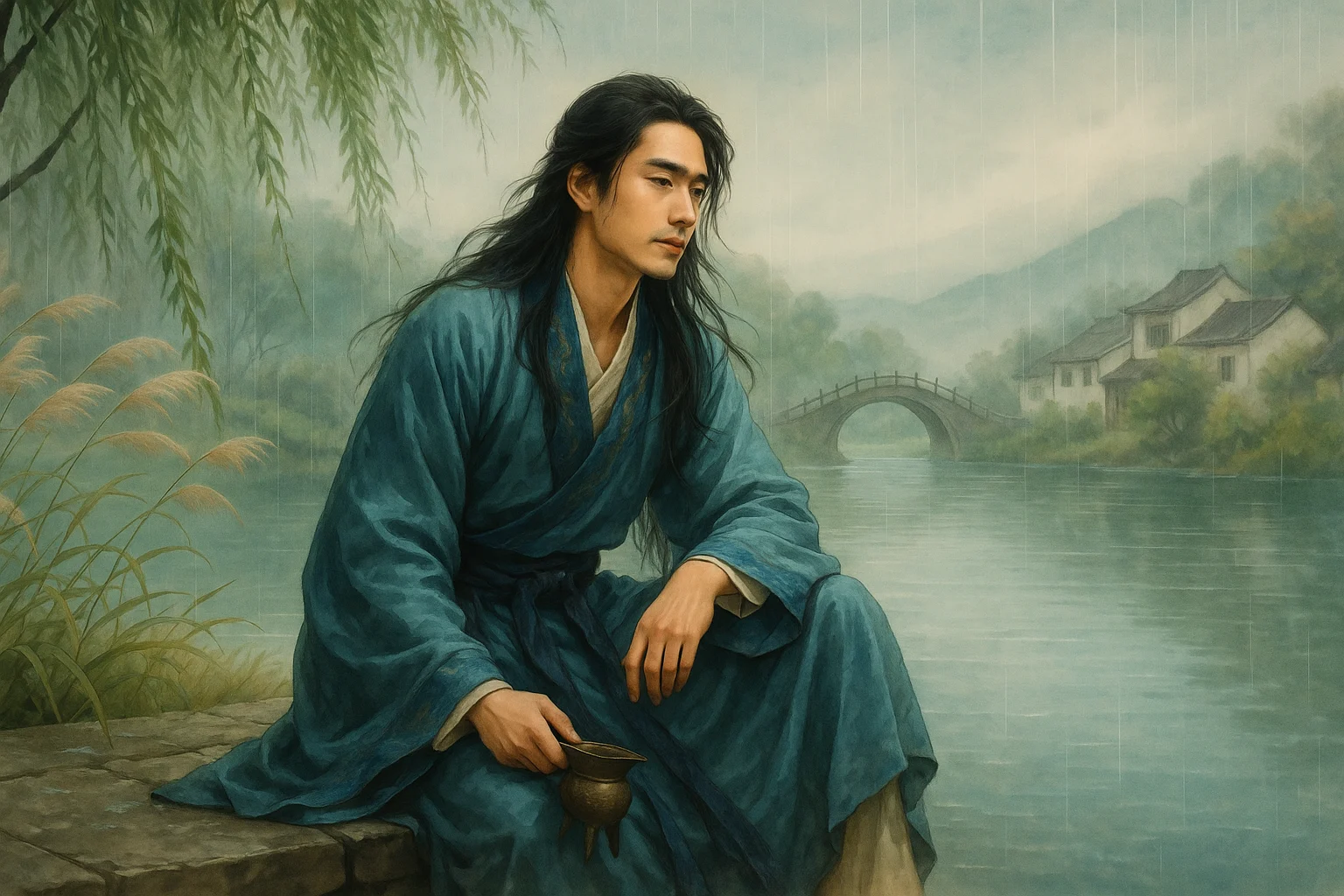
Feng Yansi (冯延巳 903 - 960), courtesy name Zhengzhong, was a native of Guangling (modern-day Yangzhou, Jiangsu) and a renowned ci poet of the Southern Tang during the Five Dynasties and Ten Kingdoms period. Rising to the position of Left Vice Director of the Department of State Affairs (Zuo Puye Tongping Zhangshi), he enjoyed the deep trust of Emperor Li Jing. His ci poetry forged a new path beyond the Huajian tradition, directly influencing later masters like Yan Shu and Ouyang Xiu, playing a pivotal role in the transition of ci from "entertainment for musicians" to "literary expression of scholar-officials."






